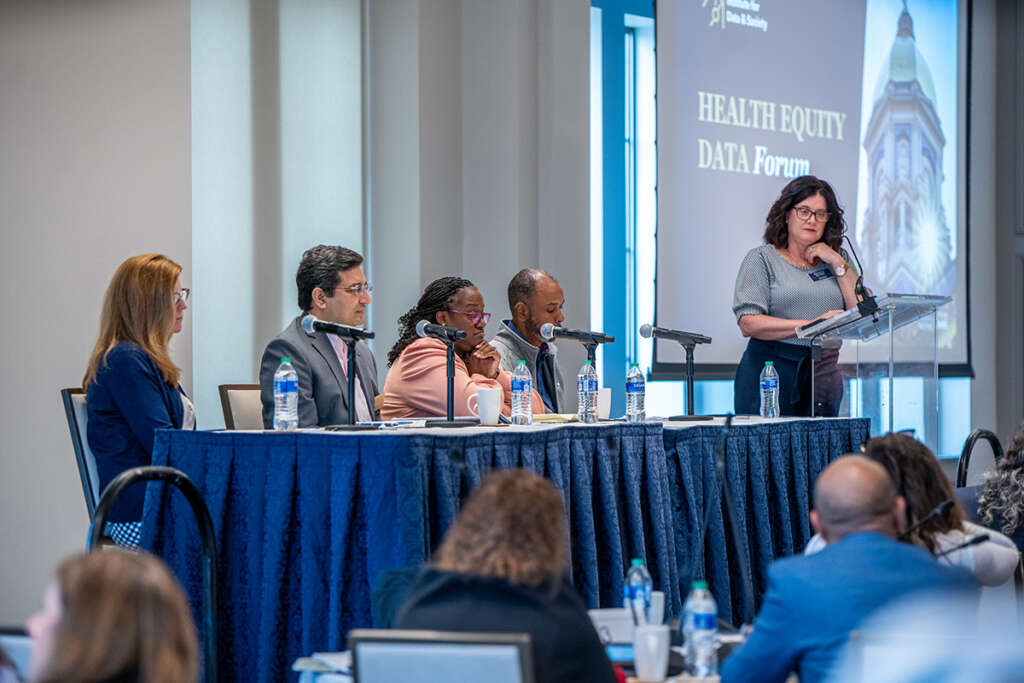Artificial intelligence (AI) is changing the way people receive healthcare. Clinicians are using AI to help detect and diagnose conditions like spina bifida occulta, and colon polyps. Others are using it to deliver precise medical interventions to ensure healthy outcomes. And the pace of AI innovation does not show signs of slowing down.
Although the healthcare benefits are promising, reliance on AI algorithms may come at a cost to millions of Americans if systems fail to address the increasing concern of algorithmic bias. A recent study of a widely used health algorithm demonstrated a 25% gap in health risk assessment scores, revealing a disparity in the provision of additional care from trained providers suggested to white Americans over Black Americans exclusively based on health costs as a determinant for health needs.

The responsible use of AI in healthcare was the central focus of the third Health Equity Data Forum, hosted by the University of Notre Dame’s Lucy Family Institute for Data & Society on April 11-12, 2024. Serving as an extension of the Health Equity Data Lab (HEDL), which launched in late 2022, the semiannual forums are an opportunity for campus and external partners to leverage AI to tackle healthcare challenges at the intersection of clinical and social determinants of health.
Keynote speakers included Catherine Quinlan, Vice President of AI Ethics at IBM, and Dr. Ankoor Shah, M.D., Chief Medical Officer and Principal Director for Accenture Health.
The forum coincided with Black Maternal Health Week and included a panel discussion to highlight the ongoing work that HEDL is conducting with industry leaders to advance equitable, data-evidenced, and accessible maternal care for the Black community. Panelists included faculty from the University of Notre Dame and Saint Mary’s College and industry health professionals who shared their insights into the existing nutritional resources available to support healthy pregnancies and to identify areas for data advancements that can work towards improving Black maternal health outcomes in Indiana.
Anaum Showkat, health equity researcher for HEDL, presented a catalog of national health equity metrics that will serve as the foundation for HEDL’s Health Equity Index working group discussions.

Attendees contributed to the forum’s working group sessions, organized by thematic areas that include “precision social determinants of health,” “health workforce of the future,” “the health equity data index,” and “beyond human resources.”
“The Health Equity Data Lab forums are supporting the University’s thematic area of health and well-being through sustainable collaborations and fostering an equitable data and artificial intelligence (AI) ecosystem,” said Nitesh Chawla, founding director of the Lucy Family Institute for Data & Society. Chawla, who is also the Frank M. Freimann Professor of Computer Science and Engineering, emphasized that, “as AI continues to advance, it is crucial that we prioritize ethical use and inclusivity to ensure that these technologies benefit all segments of society, particularly those who have been historically underserved.”
Shannon Huneke, who serves as Accenture manager of Health and Care Innovation, moderated a panel discussion on equitable and data-evidenced Black maternal health at the forum. “Accenture takes great pride in the partnership with the University of Notre Dame as well as the Lucy Institute and Health Equity Data Lab in our shared mission to apply innovation, data and technology to develop a comprehensive framework for identifying and addressing health disparities within underserved populations,” she said. “We look forward to continuing this sustainable collaboration in our joint efforts to transform communities that we serve as we strive for overall global health and wellness.”
Results from the forum will work to advance policies that address health equity and improve AI’s application toward equitable social determinants of health. The next forum is planned for October 2024. To receive notifications for upcoming HEDL forums, please sign up for the HEDL newsletter.
For more information on the work of the Health Equity Data Lab, please visit the Lucy Family Institute website.
Contact:
Christine Grashorn, Communications Specialist
Notre Dame Research / University of Notre Dame
cgrashor@nd.edu / 574.631.4856
research.nd.edu / @UNDResearch
About the Lucy Family Institute for Data & Society
Guided by Notre Dame’s Mission, the Lucy Family Institute adventurously collaborates on advancing data-driven convergence research, translational solutions, and education to ethically address society’s wicked problems. As an innovative nexus of academia, industry, and the public, the Institute also fosters data science and artificial intelligence (AI) access to strengthen diverse and inclusive capacity building within communities. Our vision is to become the preeminent intellectual beacon, inspiring collaborative, equitable, and impactful data and AI innovations as a global force for good.